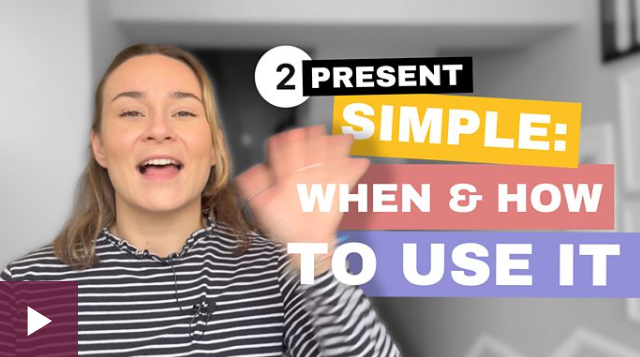USES OF PRESENT SIMPLE
PRESENT meaning:
When something happens regularly. Habits and routines.
- She plays football every Monday.
- My cousins often stay at my house at the weekends.
- I brush my teeth twice a day.
- We usually leave the house at 8AM.
Useful vocabulary for habits and routines: never, rarely, sometimes, often, usually, always, every ____, once/twice, three times a day/month/year, at the weekend, in the morning/afternoon/evening.
For something that is true now.
- I live in London.
- Mum works as an engineer.
- My grandparents are 80 years old.
- I want a hamster.
For something that is always true, or a fact.
- Fire is hot.
- Humans need oxygen to live.
- The Earth moves around the Sun.
- Light travels faster than sound.
FUTURE meaning:
When something is scheduled.
- My train leaves at 10am tomorrow.
- The museum opens next week.
- The concert starts at 8am this evening.
- My friends from Bangladesh arrive in London in December.
Useful vocabulary for schedules: at ____ (time), next Monday, next week/month/year/season, this afternoon/evening, tonight, tomorrow, tomorrow morning.
In a first conditional.
- If it snows, we’ll go to the mountains.
- If I see him, I’ll tell him you called.
- They can watch TV if they finish their homework.
- The plants will die if you don’t water the plants.
PAST meaning:
When telling a story (usually we use past tenses, but occasionally we use present tenses).
- So, I‘m at the park. There‘s a kid on the slide. He falls off and hits his head. I call an ambulance.
When you’re summarising books, films, series, plays etc.
- In the first Harry Potter book, Harry goes to Hogwarts school and makes friends with Ron and Hermione. They learn how to do magic and fight with You-Know-Who.
STRUCTURE
For positive sentences, use the main verb but add an ‘s’ for he, she and it.
- I walk
- You walk
- He walks
- She walks
- It walks
- We walk
- They walk
For negative sentences, put ‘don’t’ before the main verb for I, you, we and they, and ‘doesn’t’ before the main verb for he, she and it. ‘Don’t’ and ‘doesn’t’ are a contracted form of the auxiliary verb ‘do/does’ plus ‘not’.
- I don’t walk
- You don’t walk
- He doesn’t walk
- She doesn’t walk
- It doesn’t walk
- We don’t walk
- They don’t walk
To ask yes/no questions, add ‘do’ or ‘does’ before the pronoun.
- Do I walk?
- Yes, I do
- No, I don’t
- Do you walk?
- Yes, you do
- No, you don’t
- Does he walk?
- Yes, he does
- No, he doesn’t
- Does she walk?
- Yes, she does
- No, she doesn’t
- Does it walk?
- Yes, it does
- No, it doesn’t
- Do we walk?
- Yes, we do
- No, we don’t
- Do they walk?
- Yes, they do
- No, they don’t
To ask for more information, add the ‘who, what, where, why, how, when’ question words before ‘do’.
- Why do I walk?
- Who do you walk with?
- Where does he walk?
- When does she walk?
- How do they walk?
- When do we walk?
